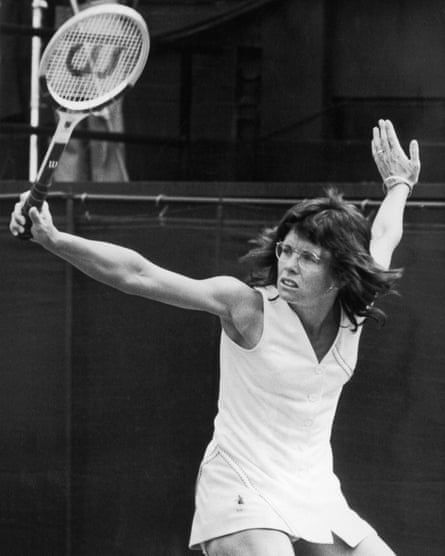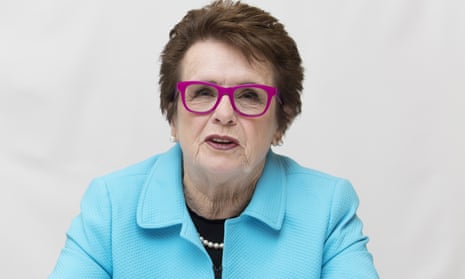Billie Jean King is still not used to seeing her name emblazoned across buildings and naming competitions, but she may soon be. The vast grounds of the US Open have long been named the Billie Jean King Tennis Center and at the WTA Finals, the governing body’s flagship event, each year the champion gleefully lifts a trophy named after her.
On Thursday the International Tennis Federation announced its own addition to that list. Its longtime women’s team competition, the Fed Cup, has been rebranded as the Billie Jean King Cup. The finals of the event will be held next April in Budapest and will feature $12m prize money, meaning the teams will earn the same as players in the Davis Cup.
“It was thrilling to hear but I was like: ‘Am I awake or am I dreaming?’” she says of her reaction to learning of the name change. “I pinch myself every so often and say: ‘Yeah, it’s true.’ And I go: ‘OK, oh it can’t be true.’ But then what I think about mostly is what can we do with this opportunity?”
King says the prize money “sends a very strong message for equality” and it is also timely. Next week marks 50 years since the birth of the Original 9, when King became the most prominent member of a group of nine female players who resisted threats of sanctions by the male-dominated governing bodies, eventually forming their own Virginia Slims Tour. Their moment of action came after the prize‑money gap from the men had reached 8:1 at the dawn of the Open era, and it would pave the way for the WTA’s formation and for tennis to become the most successful women’s sport in history.
“It was very nerve-racking, we were very scared, but we knew we were doing the right thing,” says King. “And you know what? We gotta step up and do the right thing. Not what’s popular, but what is right. And we knew it was right. My former husband told us that men would try to get rid of us because of the old boys’ network and I said: ‘No, they won’t. They’re my friends.’ He was right, I was wrong.”
In the half a century since that moment, it would have been understandable had King decided to take a step back from the sport. Although she won 12 grand slam singles titles and 39 overall, so much of her energy during her career was spent contesting inflexible men in boardrooms. Just as much effort has defined her decades since as she threw herself into social justice causes. At 76, though, her energy and will remains unfettered and she still has so much to say. In 30 minutes of conversation and ample stories from her past, she fields only four questions.

King says her current priority in her new partnership with the ITF is to see how she can help increase participation and further tennis at grassroots level, a topic which prompts her to briefly assume the role of interviewer and ask for any ideas on how to bring that to fruition. “I just like to listen to ideas from others,” she says. “I want to make a positive impact in growing our sport.” What follows is a long discussion on the future of tennis in Africa. “If you can get one kid – one girl or one boy to do well, the whole country changes.”
King says creating opportunities has always been a priority of hers, dating back to the early days of the Virginia Slims Tour when Gladys Heldman, the famed promoter of the Original 9, would identify capable black players and showcase them on their stages. “We definitely started thinking: ‘How can this [sport] belong to everyone?’ Here was our dream for future generations: any girl in the world, if she’s good enough, would have a chance to compete. Number two: she would be appreciated for her accomplishments, not only her looks. Number three: to be able to make a living. Those are the three dreams we had and the vision we had for the future. So the players today are living our dream, but we also know there’s children that aren’t able to have this dream yet.”

Money has been a common thread throughout King’s career as she has pushed for equitable prize money. Women’s tennis now produces the richest female athletes in the world and each new financial milestone is traced back to her initial efforts. “Everything goes back to money whether you like it or not. I want girls to go for the money. I want boys, too, but boys are taught to go for the money. I want girls to be taught just like the boys to go for the money. Because it provides opportunity, empowerment. You can take care of yourself, also your loved ones, your family. So many people are so poor they go to bed hungry at night.”
King offers up equal prize money at the 1973 US Open as an example of how important money can be in chasing equality, their understanding of the business side of tennis allowing them to finally break through. She describes in detail how she and other players achieved it, directly asking sponsors to make up the $55,000 difference between men’s and women’s prize money before taking her spoils to the US Open’s tournament director Bill Talbert. “He is a business guy. He said: ‘You have the money, the difference?’ I said: ‘Yes’. He went: ‘Oh my.’ You could see by his face he couldn’t believe it. So that’s why we got equal prize money in 1973 – it is because we took something to the table … I’ll never forget it as long as I live.”
So far, it has been some life. As she often tells it, she was a 13-year-old girl in Long Beach dreaming of becoming world No 1 when it occurred to her something needed to change: “I knew everyone wore white shoes, white socks, white clothes, played with white balls and everybody who played was white. And I said to myself: ‘Where’s everybody else?’” The world has changed a bit since then. Billie Jean King remains peerless.
